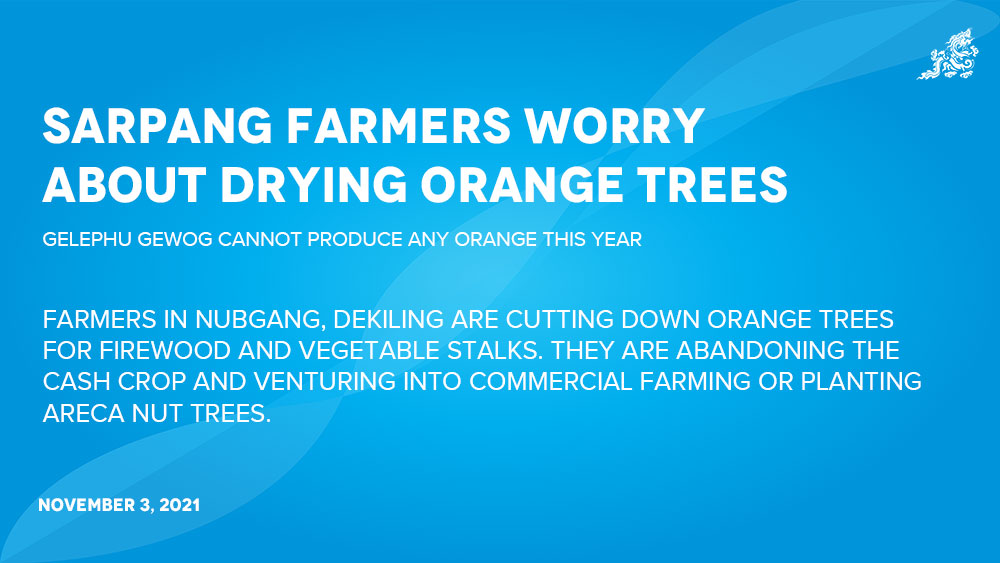Gelephu gewog cannot produce any orange this year
Nima | Gelephu
Farmers in Nubgang, Dekiling are cutting down orange trees for firewood and vegetable stalks. They are abandoning the cash crop and venturing into commercial farming or planting areca nut trees.
Oranges were the main source of income for the farmers in Nubgang. It was widely grown until citrus greening, one of the most serious citrus plant diseases in the world, emerged in the village, wiping out entire orchards. The dried orange trees remain abandoned in the orchards that were earlier filled with healthy fruiting trees.
Farmers say the problem became worse in the past three years.
Leki from Nubgang said that it was worrying to see all of the orange orchards fail in three years, as his family depended on the oranges for their livelihood.
“Living is becoming more difficult by the year. We lived a comfortable life because there were good returns from the oranges. Nothing is left now. There are no orange trees near home, or in the orchards,” he said.
He added that the family sold the orchard on contract to exporters. “We used to earn at least Nu 90,000 in a year. Exporters complained of a decreasing yield. We are not sure if they will pay us this time,” said Leki.
Most farms in Nubgang were filled with orange trees and the farmers owned separate orange orchards a few kilometres away from the village in the past. No orange trees can be seen today except for a few leafless and drying orange trees at a few homes.
Farmers said that there was no fruiting at all this time. A study was done and farmers were trained in managing orchards. However, the disease couldn’t be wiped out, as not all infected trees could be destroyed.
“The orange trees have started to die naturally. We have got no solution to this. It might also be because of soil fertility. The nature of the soil is different here. If we dig deep, we find sand and clay,” said Leki.
The farmer said that the officials from the agriculture sector have encouraged growing other cash crops. “It is equally discouraging when we don’t get the expected yield. It’s because of the poor soil quality. The orange trees might have died because of the soil,” said the farmer.
Another farmer from Nubgang said that they could replace the old trees with new seedlings, but it was not advisable because not all infected trees in the gewog have been destroyed.
“Now everyone has started growing areca nuts. Growing vegetables on a commercial scale is a challenge without a reliable water supply. We don’t have enough of a drinking water supply,” he said.
Former tshogpa from Nubgang, Dumber Singh Dahal, said that orange trees started to die in large numbers in 2014. “It will be difficult to earn income now. Some might choose to work as labourers for a living and move towards towns,” he said.
He added that the change in weather patterns could have also worsened the problem.
“There was no fruiting on time. Leaves started to drop and the whole tree dried up in two years. We tried to control the disease by spraying insecticides,” said Damber Singh.
Dekiling gewog agriculture extension officer, Sarita Rai said that the number of orange trees in the gewog fell every year. “It’s a nationwide problem caused mainly by poor orchard management. Farmers have to attend to other work and there are no good management practices,” she said.
She added that the agriculture sector, in collaboration with the agriculture research development centre (ARDC) in Samtenling, destroyed infected trees. It was not possible to cut down all of the trees because farmers were disappointed,” said Sarita Rai.
The farmers are encouraged to grow cash crops such as dragon fruit, ginger, and vegetables that are equally profitable. Orange production in Dekling has dropped every year, according to the official.
The gewog extension official said that it is challenging to procure insecticides, as it takes over six months to reach the farmers. The gewog also conducts awareness exercises on orchard management annually.
The official said that the gewog does not have the technical expertise to study the impact of the disease and works in collaboration with ARDC, Samtenling for technical supports and research.
Officials from the dzongkhag agriculture said that the citrus canopy management that focuses on improving orchard management practices and enhancing soil nutrients proved successful in Gakiling gewog.
While the disease couldn’t be wiped out without an advanced rehabilitation programme, the farmers were asked to replace orange trees with other fruit trees today.
Edited by Tshering Palden


